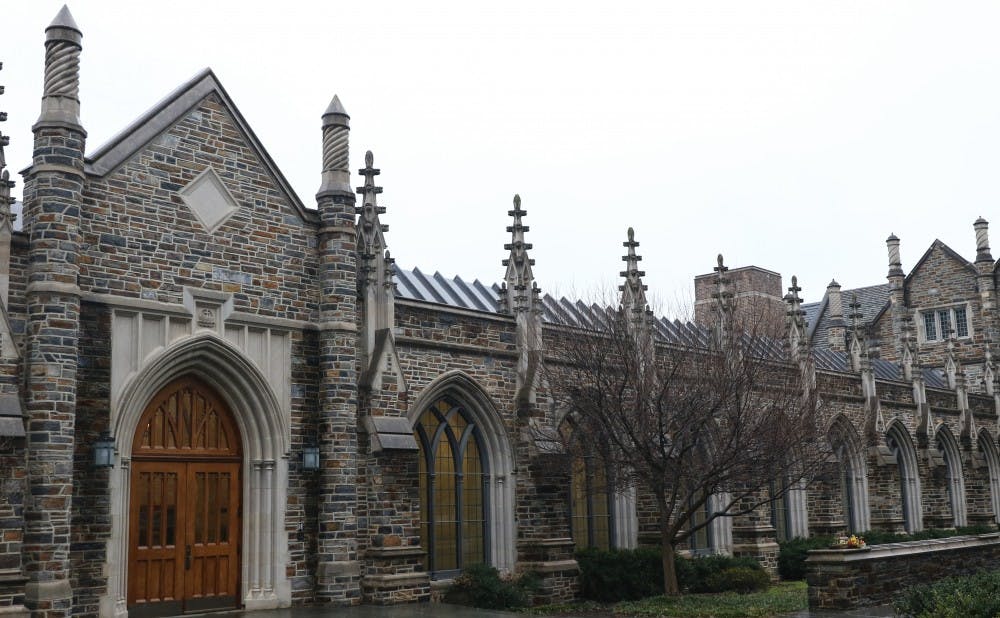Duke Divinity School professor Christena Cleveland stepped down from her position Tuesday, citing an "insidious legacy of anti-Black racism" at Duke in an open letter.
Cleveland, an associate professor of the practice of organizational studies at Duke Divinity School, joined the faculty in 2015. In her letter, she recalled attending a men's basketball game between Duke and Livingstone College—a historically black college (HBCU) in Salisbury, N.C.—and a meeting with her dean in 2015, both of which Cleveland said reinforced her perceptions of racism at Duke.
"When I joined the faculty in 2015, I was excited and hopeful that DDS would be an enriching environment in which to continue my work on theology and justice," she wrote in the letter. "On the contrary, I encountered an ongoing and insidious legacy of anti-Black racism that produces an environment that is insufferably hostile to Black people."
Cleveland did not immediately respond to a request for comment from The Chronicle through her website.
L. Greg Jones, who has served as dean of the Divinity School since August 2018, wrote in an email that Cleveland was on paid leave during the 2018-2019 academic year. He added that she had not spoken with him about her concerns.
"Her resignation came as a surprise, as she had two courses on the schedule for the fall, and we were anticipating her return from leave," he wrote. "We are grateful for her contributions to Duke Divinity School, and we wish her well in the future."
Michael Schoenfeld, vice president for public affairs and government relations, wrote in an email that he had "nothing further to add" to Jones' comment.
Elaine Heath, who served as dean of the Divinity School from 2016 to 2018, declined to comment.
Cleveland recalled an alleged meeting in the Fall 2015 semester between Cleveland and her dean, whom she does not name in the letter. The dean at the time was Ellen Davis, Amos Ragan Kearns professor of Bible and practical theology, as she served as interim dean of the Divinity School during the 2015-2016 academic year.
In the meeting, Cleveland alleged that she expressed her concerns about institutional racism at Duke.
"Some people just aren’t cut out to be faculty at Duke Divinity School," the dean responded, according to Cleveland. "It sounds like you’re one of them. I want to give you permission to leave.”
Davis did not immediately respond to a request for comment from The Chronicle.
Cleveland also described a men's basketball game she attended two weeks later with a potential donor whose gift could fund her research. She began to "regret [her] decision" to attend after realizing that the opponent was Livingstone College, an HBCU with fewer students and far less funding than Duke.
Duke men's basketball traditionally plays one of its exhibition games against the prior season's champion of the Central Intercollegiate Athletic Association, made up of predominantly HBCUs. Livingstone was the 2014 champion.
Cleveland explained she soon realized that this particular game represented more than just basketball.
"Yet what glaringly stood out to me as a newcomer to the South were the racial and religious power dynamics at play in this particular game," she wrote in the letter.
The donor who accompanied her to the game, Cleveland recalled, leaned over before halftime and told her that he saw her rooting for Livingstone, an interaction that Cleveland believed was a parallel to the dynamics on the court. She described how poor schools depend on playing rich schools for the large paychecks they receive.
Cleveland felt that same power inequity with the potential donor at that game, a white Methodist minister whose funding she "needed" to succeed at the Divinity School.
She cheered for the Blue Devils in the second half. Cleveland wrote in the letter that "the white donor was pleased with my performance, and at the end of the game he agreed to help fund my research project."
"It also reinforced the truth that though I was an 'invited guest' sitting in the stands, I was no different than the Black [Livingstone] Blue Bears on the court," she wrote. "As long as I didn’t speak up about the living, breathing white devil in blue, I would never find myself in a resource vacuum like Livingstone College."
Duke Divinity School students have previously raised concerns regarding the school's treatment of black and LGBTQ students.
In 2018, Jasolyn Harris—who was then a second-year master’s student in the Divinity School and identified as a queer black student—attributed some of the school's diversity problems to the departure of four black faculty members.
William Jennings and Eboni Marshall-Turman left Duke to teach at Yale University in the summer 2016. Esther Acolatse departed soon after, leaving Duke Divinity for Knox College. William Turner Jr.—James T. and Alice Mead Cleland professor emeritus of the practice of preaching—retired in 2018.
Although Cleveland has left Duke, she wrote in the letter that she would remain an academic. She plans on pursuing her research as an independent academic, free from working in "some ivory tower."
Editor's Note: This article was updated Wednesday afternoon to include Heath declining to comment.
Get The Chronicle straight to your inbox
Signup for our weekly newsletter. Cancel at any time.

